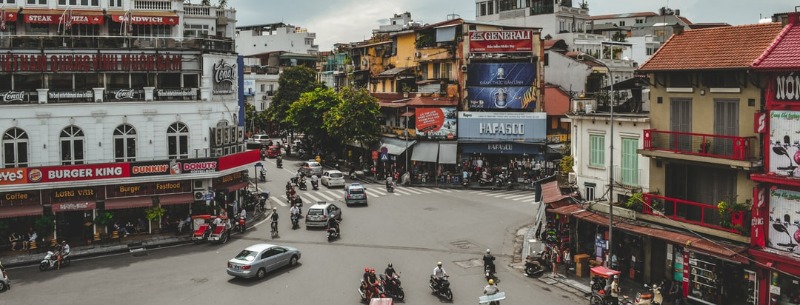Hanoi, capital city of Vietnam
Hanoi effortlessly blends new Asia’s dynamic face with the exotic vibe of old Asia. The modern and the medieval co-exist beautifully on the streets of the Vietnamese capital. In the Old Quarter, sellers set up shop on the tangled web of streets as they have for nearly a century, locals in conical hats whiz by on bicycles, grey-bearded men challenge each other to games of chess on the shores of Hoan Kiem Lake and the city’s bold and beautiful feast at posh restaurants before dancing to the latest hits at packed nightclubs. Hanoi is where the paradox of modern Vietnam comes alive, and the capital has it all: ancient history, the legacy of a colonial past and a modern outlook that remains optimistic about the future.
The brightest gem of Hanoi is its most historic and culturally important pagoda, Tran Quoc. The resplendent pagoda was built in the mid-6th century under King Ly Nam De and is considered the most important Buddhist temple in the country. Its intricate design includes ten shrines, an impressive belfry and many valuable gold-trimmed statues representing the Buddha. The West Lake provides a tranquil backdrop to the pagoda and is especially beautiful at sunset.
The legacy of the Vietnam War is still obvious in the capital, especially at the Hoa Lo Prison. Nicknamed the Hanoi Hilton by the American POWs tortured and interrogated there, much of the prison was demolished to make room for an apartment complex. What remains has been transformed into a museum that reinforces the Vietnamese government’s assertion that the prison was used only for criminals, not POWs. The interrogation room has been redesigned as a comfortable barracks-style room, and exhibits claim that those housed there were unharmed and treated well. This, of course, contradicts the many testimonies from prisoners collected after the war, making the museum a bizarre experience for Western visitors.
For a glimpse into Vietnamese culture, visit the National Museum of Fine Arts. Housed in a classical building with touches of Asian details, the collection spans two wings and includes everything from ancient antiquities to contemporary art. One of the best exhibits details the evolution of lacquer, told through sculptures of the Buddha, Hindu goddesses and the kings and queens of Vietnam.
Across the street lies the Temple of Literature, known as the Van Mieu to locals. Founded in 1070, the center is dedicated to Confucius, the Chinese philosopher. The temple features five courtyards shaded by ancient trees and made even more beautiful by ponds, commemorative steles, sage sanctuaries, and statues.
Another remarkable landmark in Hanoi is the Presidential Palace, constructed by the French at the end of the 19th century. The elegant building reflects the Italian Renaissance style and today serves as a government house. For a small fee, visitors can stroll through the perfectly manicured grounds.
The Ho Chi Minh Mausoleum is another must-see for visitors to Hanoi. The massive mausoleum sits in the center of a gigantic square and is marked by its angular gray granite facade. Twenty granite-covered pillars tower over the square, where President Ho announced Vietnams independence in September 1945. Armed honor guards keep watch over the mausoleum, but visitors are welcome to explore the inner sanctum and watch the changing of the guard ceremony each morning.
Other interesting sights in the city include the Vietnamese Women’s Museum, the charming One-Pillar Pagoda, the imposing Army Museum, the Museum of the Vietnamese Revolution and the pleasant park that surrounds Hoan Kiem Lake.
Hanoi Geographical Location
Hanoi is located in the north of Vietnam on the right bank of the Red River.
It is Vietnam’s second-largest city with a population of 6,500,000.
Hanoi Language
Vietnamese is the official language of Vietnam and English is becoming an increasingly popular second language due to tourism.
Hanoi Predominant Religion
- 81% None
- 9.5% Buddhist
- 7% Catholic
- 1.5% Hoa Hao
- 1% Cao Dai
Although the majority of the population does not identify with a specific religion, the people of Vietnam live by philosophies that have been pieced together by many traditional religions of the country.
Hanoi Currency
The Dong is the official currency of Vietnam.
Hanoi Climate
Hanoi is rainy throughout the year with humidity. The summers can become uncomfortably hot while the winters are comparatively cool.
Hanoi Main Attractions
- The Hanoi Hilton (Hoa Lo Prison)
- One Pillar Pagoda
- The Temple of Literature
Other Attraction in Hanoi
- Lake of the Restored Sword
- Old Quarter
- Hanoi Flag Tower
- Thang Long Water Puppet Theater
